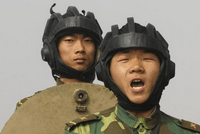Depending on your perspective, the original "Red Dawn," released in 1984, was either a coming-of-age milestone or a crime against the medium of cinema. The movie pitted a high school football team in rural Colorado against the better part of a Soviet airborne brigade, the former led by Patrick Swayze and the latter led, for some reason, by a Cuban colonel. Not surprisingly for an American film, the Americans do quite well, although they are eventually overwhelmed by the firepower of Soviet helicopter gunships.
Later this year, a remake of "Red Dawn" will hit the screens in the United States. Initially, the producers had planned to replace the original version's coalition of Russian, Nicaraguan and Cuban soldiers with Chinese invaders. Unfortunately, a sense of commercial viability prevailed over the studio: Reports now indicate that the remake's invaders will be the even less realistic North Koreans, a change designed to preserve the film's marketability to the ever-growing Chinese movie-going audience.
In 1984, no one needed to worry about the preferences of Russian movie viewers. The Kremlin hated "Red Dawn" -- as well as "Rocky IV," in which an American boxer defeats a steroid-laden Soviet stereotype to the cheers of a Russian crowd -- but no one in Hollywood cared. The Russian market was irrelevant to the United States, both in terms of film specifically, and in terms of trade more generally. Such is not the case with the United States and China, however. On virtually every conceivable set of economic metrics, the United States and the People's Republic of China are tightly integrated. For the international system, this is probably a good thing, as hopefully the potential costs of conflict to both sides render war unimaginable. For the Republican Party of the United States, however, it presents a quandary. How ought GOP presidential candidates present the U.S. relationship with China in their campaigns?

